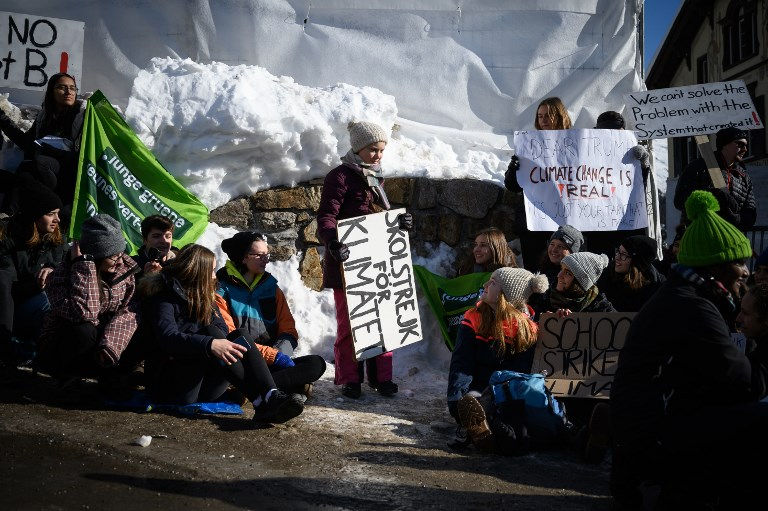“School strike for climate”: high school students shake up the agenda
"I would like them to forget their personal interests and focus on the climate": with this appeal to world leaders at COP 24 in December 2018 and then at the World Economic Forum in Davos in January 2019, young activist Greta Thunberg became the icon of a youth movement calling for radical change in environmental policy.
Sylvain Wagnon, University of Montpellier

In Davos, young Swedish activist Greta Thunberg, who started the school strikes for climate action, joins Swiss high school students. Fabrice Coffrini/AFP
In August 2018, this 16-year-old Swedish high school student began protesting in front of the Swedish parliament, and has since been striking every Friday to demand swift political action in the face of threats to the planet's equilibrium.
Through this individual investment and her outspoken criticism of adults' inaction, she has highlighted the younger generations' clear-eyed view of the risks posed by global warming. It is no coincidence that her message has struck an immediate chord in Australia, a country already suffering the consequences of climate change.
Urgency for action
Through her activism, Greta Thunberg has also pioneered a very unique and unprecedented form of action. This school strike serves as both a wake-up call about the urgent need to take action on climate change and a reminder of the importance of education. But is this just a protest? The name chosen , "Fridays for Future," seems more like a call for awareness than a nihilistic act.
Nevertheless, Greta Thunberg points out, "Why should we study for a future that will soon no longer exist, when no one is doing anything to save it?" Knowledge is the future, but it is through action that we can save the planet.
An international phenomenon, the "Youth For Climate" marches are gaining momentum across Europe, from Scandinavia to Switzerland, via the Netherlands, Germany, Belgium, and the United Kingdom. At the same time, schoolstrike4climate, the school strike movement, is relaying Greta Thunberg's call for a global school strike on March 15, 2019.
In France, climate marches have been overshadowed by the yellow vest movement, which has dominated public debate since November 2018. The situation in France may even seem paradoxical, with the yellow vests seemingly prioritizing "making ends meet before saving the world" and young people emphasizing that their future will only have meaning if the planet still exists.
Beyond the programs
These strikes challenge the educational institution on several levels. First, it is a mobilization of "young people" and teenagers in connection with their status as high school students. Their action aims to assert the importance of their role in society: they are the future of our societies, and the future of our planet is their future. Secondly, these protests highlight the inaction or slowness of governments on environmental issues.
Since 2005,education for sustainable development (ESD) has been integrated into public education programs, helping students understand the complexity of the world in its scientific, ethical, and civic dimensions. But this education falls far short of the urgency of ecological transition. In November 2010,UNESCO published its action plan to tackle climate change through education. But school strikes, while taking up the seventeen sustainable development goals published by the United Nations in 2015, are disrupting the planned agenda.
Given their unique nature, aren't school strikes a lever for real awareness, with school strikes becoming the equivalent of hunger strikes, and knowledge a necessity for survival, just like food? It is education as a means of emancipation that is also being questioned. How can education be used as a tool for social transformation and individual and collective emancipation? How can we reconcile the need to think and the need to act?
Beyond education on sustainable development, some young people seem to have found their own way to protest and hold governments accountable.![]()
Sylvain Wagnon, Professor of Education Sciences, Faculty of Education, University of Montpellier
This article is republished from The Conversation under a Creative Commons license. Readthe original article.